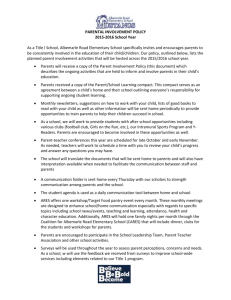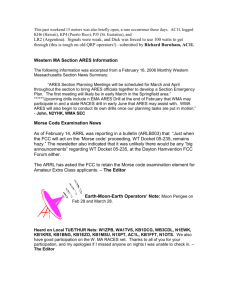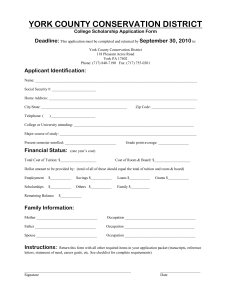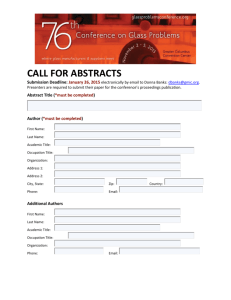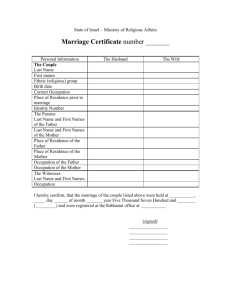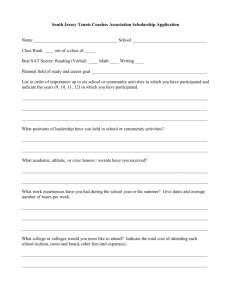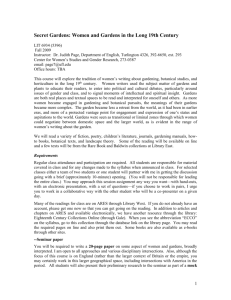Word
advertisement
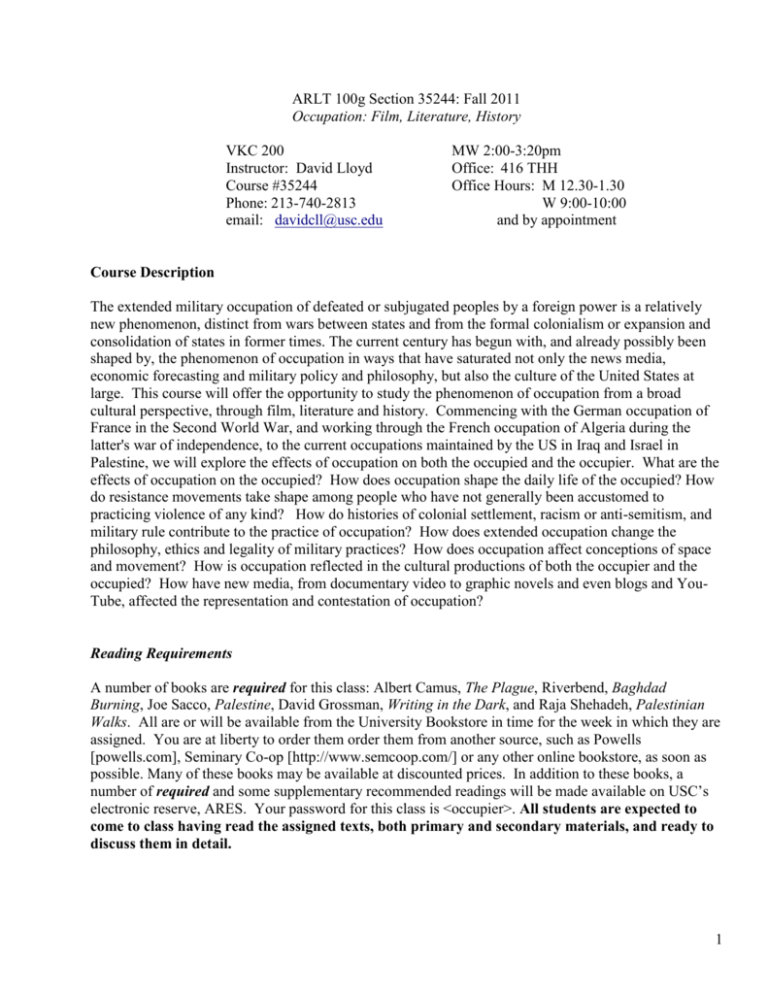
ARLT 100g Section 35244: Fall 2011 Occupation: Film, Literature, History VKC 200 Instructor: David Lloyd Course #35244 Phone: 213-740-2813 email: davidcll@usc.edu MW 2:00-3:20pm Office: 416 THH Office Hours: M 12.30-1.30 W 9:00-10:00 and by appointment Course Description The extended military occupation of defeated or subjugated peoples by a foreign power is a relatively new phenomenon, distinct from wars between states and from the formal colonialism or expansion and consolidation of states in former times. The current century has begun with, and already possibly been shaped by, the phenomenon of occupation in ways that have saturated not only the news media, economic forecasting and military policy and philosophy, but also the culture of the United States at large. This course will offer the opportunity to study the phenomenon of occupation from a broad cultural perspective, through film, literature and history. Commencing with the German occupation of France in the Second World War, and working through the French occupation of Algeria during the latter's war of independence, to the current occupations maintained by the US in Iraq and Israel in Palestine, we will explore the effects of occupation on both the occupied and the occupier. What are the effects of occupation on the occupied? How does occupation shape the daily life of the occupied? How do resistance movements take shape among people who have not generally been accustomed to practicing violence of any kind? How do histories of colonial settlement, racism or anti-semitism, and military rule contribute to the practice of occupation? How does extended occupation change the philosophy, ethics and legality of military practices? How does occupation affect conceptions of space and movement? How is occupation reflected in the cultural productions of both the occupier and the occupied? How have new media, from documentary video to graphic novels and even blogs and YouTube, affected the representation and contestation of occupation? Reading Requirements A number of books are required for this class: Albert Camus, The Plague, Riverbend, Baghdad Burning, Joe Sacco, Palestine, David Grossman, Writing in the Dark, and Raja Shehadeh, Palestinian Walks. All are or will be available from the University Bookstore in time for the week in which they are assigned. You are at liberty to order them order them from another source, such as Powells [powells.com], Seminary Co-op [http://www.semcoop.com/] or any other online bookstore, as soon as possible. Many of these books may be available at discounted prices. In addition to these books, a number of required and some supplementary recommended readings will be made available on USC’s electronic reserve, ARES. Your password for this class is <occupier>. All students are expected to come to class having read the assigned texts, both primary and secondary materials, and ready to discuss them in detail. 1 Writing Requirements You are required to write three brief response papers (3 pages each), due on September 14, October 17, and November 9. In your response you may focus on a single work read or viewed in the class to date and discuss what it reveals about the phenomenon of occupation, resistance, or about the literary or visual forms in which the understanding of or response to occupation may be framed. In the second and third response paper, you may engage in comparative discussion of two texts we have read or works we have viewed. At least one of the three response papers should be on an historical, political or journalistic account; at least one must analyze a creative work—film, novel, memoir, documentary, blog, etc. You may submit your response papers either in hard copy or as an e-mail attachment by 5pm on the date due. A longer final paper (10 pages), which should discuss together several works or issues we have discussed, read or viewed in the class, will be due December 7. It must be submitted by e-mail by 5pm on that date. A short paragraph describing your intended final paper topic should be turned in by October 19. You are not bound to this topic if your ideas evolve, but this deadline is designed to focus your thinking and encourage you to read or view ahead. A draft or detailed outline of the paper will be due November 16. We will talk about possible topics in class and you should discuss your topic and approach with me in office hour before commencing. Your final paper may build on any or all of the response papers previously submitted. Electronic paper submission: for the final paper, and for any other electronic submission you choose to do, please attach in word document format. Save your paper using your name, arlt, and paper number, eg: camus.arlt.paper1.doc. Use the word paper and the number in your subject line: eg, arlt paper 2. This makes it much easier for me to locate and retrieve your papers. Late paper policy: Late papers will be deducted one part of a grade for each day they are late (e.g., a paper graded as B+ will only receive a B if one day late; B- if two days late, etc.). Plagiarism Plagiarism is the unacknowledged, substantial use of any other person’s work as if it were one’s own. This includes borrowings from books, copying from others’ essays, and, please note, cutting and pasting from websites. Such use of others’ work verbatim or even in paraphrase does not constitute “research”. Like many other instructors, I do make a practice of googling passages from your essays wherever I suspect the possibility of plagiarism. The penalty for plagiarism may be failing the class and in especially serious case, academic sanction up to and including expulsion from the university. Academic dishonesty is regarded as a serious offence. Be warned. For USC policy on plagiarism and academic dishonesty, see: http://web-app.usc.edu/scampus/1100-behavior-violating-university-standards-and-appropriatesanctions/ 2 For an Academic Integrity Overview, see http://www.usc.edu/student-affairs/SJACS/forms/AcademicIntegrityOverview.pdf Disability Policy Any student requesting academic accommodations based on a disability is required to register with Disability Services and Program (DSP) each semester. A letter of verification for approved accommodations can be obtained from DSP. Please be sure the letter is delivered to me (or to TA) as early in the semester as possible. DSP is located in STU 301 and is open 8:30 a.m.-5:00 p.m., Monday through Friday. The phone number for DSP is (213) 740-0776. Other Requirements: Film viewing: As advertised in the course description, I am scheduling a total of six evening viewings during the semester at 7.00 pm (see dates on syllabus below). All are on Sunday evenings, in THH 102, to avoid clashes with other classes. These will be required for all students in the class (and are open to anyone you wish to invite). If you are absolutely unable to make any of these dates, you should see me well in advance. It will mostly be possible to view the dvds at the Audio-Visual Library to make up for missing the screenings, but it is not advisable as the screenings will be followed by discussion. Brief popquizzes will be set for each film viewed in the class in which it is to be discussed. Participation and Presentations In addition to individual contributions to class discussion, every student will be required to participate in a research group that will take responsibility for leading discussion of the assigned materials for one class at intervals throughout the semester. Presenters should prepare a brief commentary on the assigned work, linking it to previous class discussions and lectures, and conclude with three or four questions to initiate and focus class discussion. Where relevant, presenters will be responsible for reading any recommended texts on ARES in addition to the primary assigned materials. All students are strongly encouraged to make use of this recommended material at any time. You must look ahead in the syllabus and be ready to choose the topic/assignment on which you will present by the third or fourth week of class, September 14 at the latest. Grading Responses: Presentations: Participation: Quizzes: Final Paper: 45% 10% 10% 5% 30% 3 SCHEDULE OF CLASSES August Week 1 8/22: Introduction 8/24: Watch Battlestar Galactica, Disc 3.1, episode 2. Week 2: France under German Occupation 8/28: 7.00 pm: Watch Melville, Army of Shadows [1969, feature, 145 mins: http://www.imdb.com/title/tt0064040/] 8/29: Discuss Army of Shadows. Readings: Richard Cobb, French and Germans, Germans and French, pp. 145-177 [ARES] and Robert Gildea, “Murder” and “Terror”, from Marianne in Chains, chaps. 10 and 11 [ARES] 8/31: Reading: Camus, The Plague [book]. September Week 3 9/5: Labor Day Holiday 9/7: Camus, The Plague (continued). Week 4 9/11: 7.00 pm: Watch Malle, Lacombe, Lucien [1974: feature, 138 mins, http://www.imdb.com/title/tt0071733/] 9/12 Discuss Lacombe, Lucien. First response paper due. 9/14: Algeria under French Occupation Frantz Fanon, “Algeria Unveiled” [ARES]. Week 5 9/18: 7:00 Watch Pontecorvo, Battle of Algiers [1967, feature, 121 mins: http://www.imdb.com/title/tt0058946/] 9/19: Discuss Battle of Algiers. Reading: Frantz Fanon, “Concerning Violence” [ARES] 4 9/21: Iraq under US Occupation Readings: Monthly Review, Behind the Invasion of Iraq, 54-107 [ARES]; Stephen Zunes, “US: Belligerent Hegemon”, pp. 21-36 [ARES]; Robert Kagan and Irving Kristol, “The Right War”, pp. 1835; Francis Fukuyama, “The Neoconservative Moment”, and Charles Krauthammer, “In Defense of Democratic Realism”, pp. 170-200 [ARES]. Recommended: James Fallows, “Blind Into Baghdad”, pp. 53-106 [ARES]. Week 6 9/25: 7.00 pm, Watch Longley, Iraq in Fragments [2007, documentary, 94 mins: http://www.imdb.com/title/tt0492466/] 9/26: Discuss Iraq in Fragments. Reading: Haifa Zangana, City of Widows, pp. 25-79 and 107-147 [ARES]. Recommended: Farnaz Farsihi, Waiting for an Ordinary Day, pp. 236-273 [ARES]. 9/28: Readings: Nasser Hussain, “Counterinsurgency’s Comeback: Can a colonialist strategy be reinvented?” http://bostonreview.net/BR35.1/hussain.php; Dominic Caraccilo and Andrea Thompson, Achieving Victory in Iraq, pp. 29-57 [ARES]; Eric Herring and Glen Rangwala, Iraq in Fragments, pp. 161-209 [ARES]; Recommended: Ahmed Hashim, Insurgency and Counter-Insurgency in Iraq, pp, 271344 [ARES]; Noam Chomsky and Gilbert Achcar, Perilous Power, pp. 103-115 [ARES] October Week 7 10/2: 7:00 pm: Watch Rasheed, Underexposure [2005, feature, 74 mins: http://www.imdb.com/title/tt0464288/] 10/3: Discuss Underexposure. 10/5: Reading: Riverbend, Baghdad Burning [book]. Week 8 10/10: In class: watch Sebastian Junger and Tim Hetherington, Restrepo [2010, documentary, 93 mins: http://www.imdb.com/title/tt1559549/] 10/12: Discussion of Restrepo. Week 9: Palestine Under Israeli Occupation 10/17: Reading: Avi Shlaim, The Iron Wall, pp. 1-27 [ARES] and Uri Ram, “The Colonization Perspective in Israeli Sociology”, in Ilan Pappe, The Israel/Palestine Question, pp. 53-77 [ARES]. 5 Second response paper due. 10/19: Reading: Bernard Wasserstein, pp. 5-30 and 99-137 [ARES]; Rahid Khalidi, The Iron Cage, pp. 182-217. Research Paper topic due. Week 10 10/24: Readings: Neve Gordon, Israel’s Occupation, pp. 169-222 [ARES] and Saree Makdisi, Palestine Inside Out, pp. 153-207 [ARES]. 10/26: Reading: Joe Sacco, Palestine [graphic novel]. Week 11 10/30: 7:00 pm: Watch Abu-Assad and Beyer, Paradise Now [2005, feature, 90 mins: http://www.imdb.com/title/tt0445620/] 10/31: Discuss Paradise Now. Reading: Ghassan Hage, “’Comes a Time We Are All Enthusiasm’: Understanding Palestinian Suicide Bombers in a Time of Exighophobia”, pp. 65-89 [ARES]. Recommended: Ted Honderich, Right and Wrong, pp. 114-158 [ARES] November 11/2: Reading: Benny Morris, One State, Two States, pp. 161-201 [ARES]; Alan Dershowitz, The Case against Israel's Enemies, pp. 98-142 [ARES]; and Marwan Bishara, Palestine/Israel: Peace or Apartheid, pp. 151-168 [ARES]. Week 12 11/7: Reading: David Grossman, Writing in the Dark [book]. 11/9: Reading: David Grossman, Writing in the Dark [book]. Recommended: Jacqueline Rose, The Question of Zion, pp. 108-155 [ARES] and Steven Salaita, introduction to Israel’s Dead Soul, pp. 1-11. Third response paper due Week 13 11/14: Reading: Raja Shehadeh, Palestinian Walks [book]. 6 11/16: Reading: Raja Shehadeh, Palestinian Walks [book]; Marwan Bishara, Palestine/Israel: Peace or Apartheid, pp. 132-150 [ARES] and Eyal Weizman, Hollow Land, pp. 111-137 [ARES]. Draft of Final Paper Due by email. Week 14 11/21: Discussion and Review 11/23: THANKSGIVING RECESS 11/24: THANKSGIVING RECESS Week 15 LAST CLASSES: The Future of Occupations 11/28: Readings: Naomi Klein, The Shock Doctrine, pp. 513-559 [ARES] and Eyal Weizman, Cities without Citizens, pp. 167-199. 11/30: Discussion and Review December 12/7: Final Paper due by email. 7 Student Behavior, Disability, and Integrity Student Behavior Behavior that persistently or grossly interferes with classroom activities is considered disruptive behavior and may be subject to disciplinary action. Such behavior inhibits other students’ ability to learn and an instructor’s ability to teach. A student responsible for disruptive behavior may be required to leave class pending discussion and resolution of the problem and may be reported to the Office of Student Judicial Affairs for disciplinary action. These strictures may extend to behaviors outside the classroom that are related to the course. Students with Disabilities Any student requesting academic accommodations based on a disability is required to register with Disability Services and Programs (DSP) each semester. A letter of verification for approved accommodations can be obtained from DSP. Please be sure the letter is delivered to me (or to TA) as early in the semester as possible. DSP is located in STU 301 and is open 8:30 a.m.--5:00 p.m., Monday through Friday. The phone number for DSP is (213) 740-0776. Academic Integrity USC seeks to maintain an optimal learning environment. General principles of academic honesty include the concept of respect for the intellectual property of others, the expectation that individual work will be submitted unless otherwise allowed by an instructor, and the obligations both to protect one's own academic work from misuse by others as well as to avoid using another's work as one's own. All students are expected to understand and abide by these principles. SCampus, the Student Guidebook, contains the Student Conduct Code in Section 11.00, while the recommended sanctions are located in Appendix A: http://www.usc.edu/dept/publications/SCAMPUS/gov/. Students will be referred to the Office of Student Judicial Affairs and Community Standards for further review, should there be any suspicion of academic dishonesty. The Review process can be found at: http://www.usc.edu/student-affairs/SJACS/. 8
